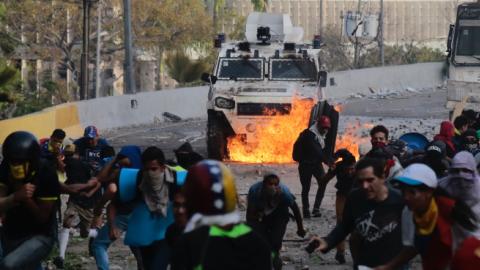The Trump administration has responded robustly to the coup led by Nicolas Maduro in Venezuela, which began with fraudulent elections in 2018 and continued with his illegal assumption of presidential powers this year. As the White House and State Department piled diplomatic pressure on his illegitimate regime by joining 54 countries in recognizing Juan Guaido as the interim president of Venezuela, the Treasury Department pursued an aggressive economic sanctions against the most dangerous supporters of Maduro, and federal law enforcement hunted down billions of dollars stolen from the Venezuelan people by the corrupt Chavistas.
But as the standoff between the Venezuelan government in waiting and the entrenched mafia of Maduro descends into chaos on the streets, more must be done to reassure the Venezuelan people. It is time for the United States to reach out with a big offer, not only to sway the wavering military supporters of Maduro, but to open a partnership with citizens who may soon face the daunting task of rebuilding their now decimated country.
First, the Treasury Department should continue to impose tough sanctions on supporters of Maduro where appropriate. But it should also issue a solid public guarantee that these sanctions will be lifted within 48 hours of the Treasury Department receiving official notification that the individual or organization in question has reaffirmed their loyalty to the Venezuelan constitution, or at the very least has surrendered to justice.
Second, the Trump administration should work with Congress to prepare and fund a truly unprecedented assistance package that is ready to be mobilized the moment that Guaido sets foot inside Miraflores Palace. In addition to urgent humanitarian assistance, this should include massive financial support to rebuild the pillaged Venezuelan public funds, restore its ravaged institutions, and repair its neglected crumbling infrastructure.
But the kind of crime and corruption networks that sustain the Maduro regime do not disappear overnight, or even with a change of government. It would be futile to pour American taxpayer dollars into a country whose economy has been gutted by graft before supporting and insisting upon the kind of reforms that will prevent their simply being stolen again. Good governance is a prerequisite for rebuilding the robust democracy and functioning economy that Venezuelan citizens deserve. With unrivaled expertise and resources, the United States is uniquely placed to help a democratic Venezuelan government restore peace with the rule of law.
Beyond reconstruction efforts, the United States should outline a vibrant future partnership with a democratic Venezuela, offering the promise of fresh trade deals, enhanced security cooperation, and perhaps even special visa arrangements. If that seems excessive, or at least unlikely given the lack of domestic American appetite for overseas commitments and immigration, consider the costs of inaction or half hearted measures.
If Guaido prevails as president, he will inherit an economy crippled by corruption, poisoned by Russian malign influence, and suffocated by Chinese debt diplomacy. The United States has a stark choice between throwing everything into supporting the regrowth of Venezuela into a reliable security partner and friendly democracy with a thriving economy, or accepting the national security consequences of a failed kleptocratic wasteland under the control of adversarial strategic international rivals.
Third, the Trump administration should announce the creation of a Justice for the Venezuelan People Fund, comprising the billions of dollars stolen by the cronies of Maduro and that have been confiscated by federal law enforcement. At present, such funds disappear into the coffers of the Treasury Department. Efforts to repatriate them to troubled jurisdictions are opaque and fraught with political and legal challenges. It makes sense to publicly ringfence them in a transparent and accountable way, with the promise that they will be returned once the democratic government is restored and key benchmarks to safeguard against corruption are met.
Meanwhile, federal law enforcement should bolster the efforts to track down pilfered Venezuelan wealth through the global financial system. Corruption has completely gutted the Venezuelan economy and starved its inhabitants, but the United States inadvertently plays a role when the stolen funds are laundered through anonymous shell companies into real estate in Miami and other desirable cities. The proceeds of Venezuelan corruption taint American professionals who handle it and fuel organized crime within the United States, as well as drive up property prices for ordinary American citizens. To support federal law enforcement agencies, Congress must pass legislation banning anonymous ownership of shell companies to prevent their use in Chavista money laundering schemes.
The Venezuela plight is not a Cold War clash between capitalism and socialism. It is a modern struggle between democratic government and transnational authoritarianism fueled by crime and corruption. Chavismo is not an ideology but a veiled disguise for the squalid enrichment of the criminals who have impoverished their people and betrayed their country. As Russia wreaks havoc and China mutilates global norms, it is now time for the United States to step up and show the Venezuelan people that it follows a different path and will always stand by friends who do the same.



















